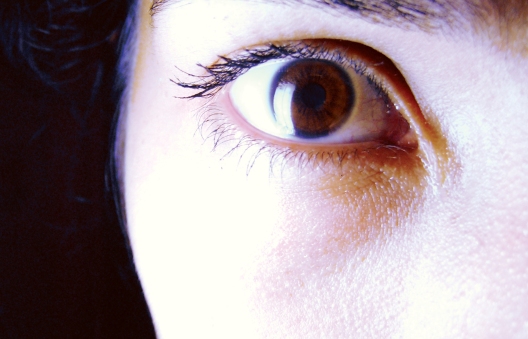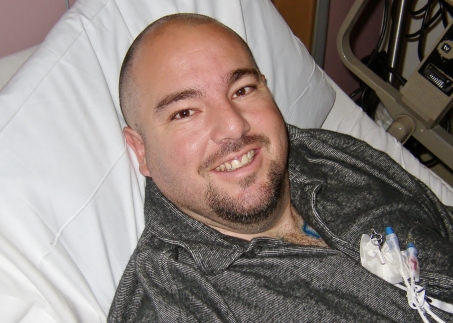There are moments in your life that are seared in your recollection. Even though some of the finer details may fade with time, your heart is permanently branded with the memory. This is the story of one of those encounters.
In early 2003, my husband, Matt, underwent a stem cell transplant to eradicate the mutant white blood cells coursing through his veins. AKA – leukemia. For those who are blissfully unaware of the process, let me give provide you with a brief timeline:
- What you don’t know will hurt you: The presentation of the 150+ page quick-reference guide describing the ins and outs of a transplant.
- Getting to know you: Test after test after test to prepare the candidate for the procedure; including, but by no means limited to: multiple scans, blood work, full-body measurements, and psychological evaluations.
- End of the world as you know it: A combination of total body irradiation and chemotherapy to exterminate the diseased bone marrow. The patient’s native immune system is systematically obliterated.
- Knowing what’s good for you: Harvesting and transplanting of the donor’s stem cells. In Matt’s case, his sister was the gracious benefactor.
- Don’t know what hit you: While waiting for the donor cells to graft into the recipient’s immune system, the patient is extremely vulnerable to life-threatening infections. He or she is moved to an isolation room for protection. My story takes place during this precarious time.
- Knowing whether to laugh or cry: Matt was given a 60 percent chance of not making it through the ordeal. It took eight weeks to see if he would overcome the odds.
During Matt’s entire hospital stay, he was never left alone. I would arrive each morning by 6:30 to catch his doctor on his early rounds. One or both of his parents would come each evening to relieve me and spend the night. The nurses at his facility were some of the best in their field, but with an entire ward of critical patients, they were stretched thin. Our devoted trio strove to pick up some of the slack. There was always someone there to hold Matt’s hand, fetch the vomit bucket, or help him to the bathroom.
The days in isolation were some of the darkest. The patient feels like they are dying (quite frankly, they are) and, at their lowest point, begs you to let them. All traces of their original bone marrow – the production locale of blood cells – have been annihilated. This grueling prep must be completed in order for the donor stem cells to seize control.
It’s the medical equivalent of a hostile takeover.
Blood cell counts are done repeatedly to gauge progress. White blood cell (WBC) counts for healthy individuals typically run from 5,000-10,000. A stem cell transplant patient begins isolation with WBCs in the single digits. Waiting for the new cells to take root and multiply is like trying to make an industrial vat boil using only a birthday candle. Slow and tedious, you are constantly worried the candle might burn itself out before the water even reaches a simmer.
Previously, I would quickly grab a light lunch to eat back in Matt’s room. Outside food, however, was not allowed in the isolation wards. Stubbornly glued to Matt’s bedside during this perilous phase, I was skipping nearly every meal. When this absence of nourishment was combined with my lack of sleep and constant worry, I was in danger of needing my own hospital bed.
Whenever you spend any length of time in a medical facility, it doesn’t take long to know much of the nursing staff on a first-name basis. Most of them will take care of your loved one up to a week at a stretch. There are a few, however, that only appear for a day or two. These fleeting engagements can prevent you from ever learning the names of these particular providers of mercy. Such is the case of the nurse with kind eyes.
She came in one morning, introduced herself (again, can’t recall her name), and tended to Matt. She popped back in each hour just like every other nurse had been doing for the past week. After about hour five, she asked if I was going to lunch. “No,” I replied, “I’m afraid to leave.” The nurse look a little concerned, but nodded as she left. I had been asked that question many a time and thought nothing of it.
An hour or so later, she returned, a small paperback book in her hands. “Go eat. You need your strength,” she instructed. “I’m taking my lunch in here.”
“He won’t be alone.”
She was of Asian descent and her gaze was sympathetic. Beyond that, I am unable to recall her appearance. Nevertheless, I will never forget the effect she had upon me. My mind had been hissing with incessant anxiety. In the short amount of time it took to reach the cafeteria, I was able to settle my fears down to a steady purr. The kind-eyed nurse took on my “burden” for less than an hour, just long enough to rejuvenate my stamina for the weeks and months that lied ahead. Her act of compassion still resonates more than a decade later.
This essay is the second installment in my Bucket List of Gratitude. Check out my inaugural piece to learn more about my goal to recognize the not-so-random acts of kindness that have impacted my life.


Thanks for sharing this. My mother is in a Rehab after a UTI and falling. I agree with the first name basis. These folks are heroes.
LikeLiked by 1 person
Thank you! I hope and pray your mother recovers quickly. ❤
LikeLike
I stumbled upon your blog the other day, and cannot believe how much I can relate to your story. I am in my late 40’s with college and highschool children, My husband passed away a couple of months ago from a long battle with diabetes and resulting kidney disease. His nurses at the dialysis center truly stand out. They really loved him and were so amazing day in and day out. I drove by the center the other day, wanted to go in to say thank you, but couldnt bring myself to go in. I will wait until I am having a “good” day so that I dont completely fall apart while there. Thanks for sharing.
LikeLiked by 1 person
I’m sorry for your loss! Your emotions must still be pretty raw.
Thank you for your kind words! I started writing as a way of processing my own grief. It an unexpected blessing when it ends up helping others.
As for the nurses – don’t push yourself, you’ll get there. If you really want to thank them before you can visit face-to-face, why not send a short note or letter? If not, don’t add to your emotional overload by fretting about such matters. Caring for your family and yourself is a heavy enough burden.
Take care, ❤ Lisa
LikeLike
Matt still had that smile on his face! Wow, powerful message. I hope all is well. I remember entering Chaminade in 7th grade and battling with Matt in football and basketball, even though we were on the same team, to prove to each other we were the best on the field or court. He was always a fierce competitor who always battled!
LikeLike
Thanks Mike! He continued to battle every day!!
LikeLike